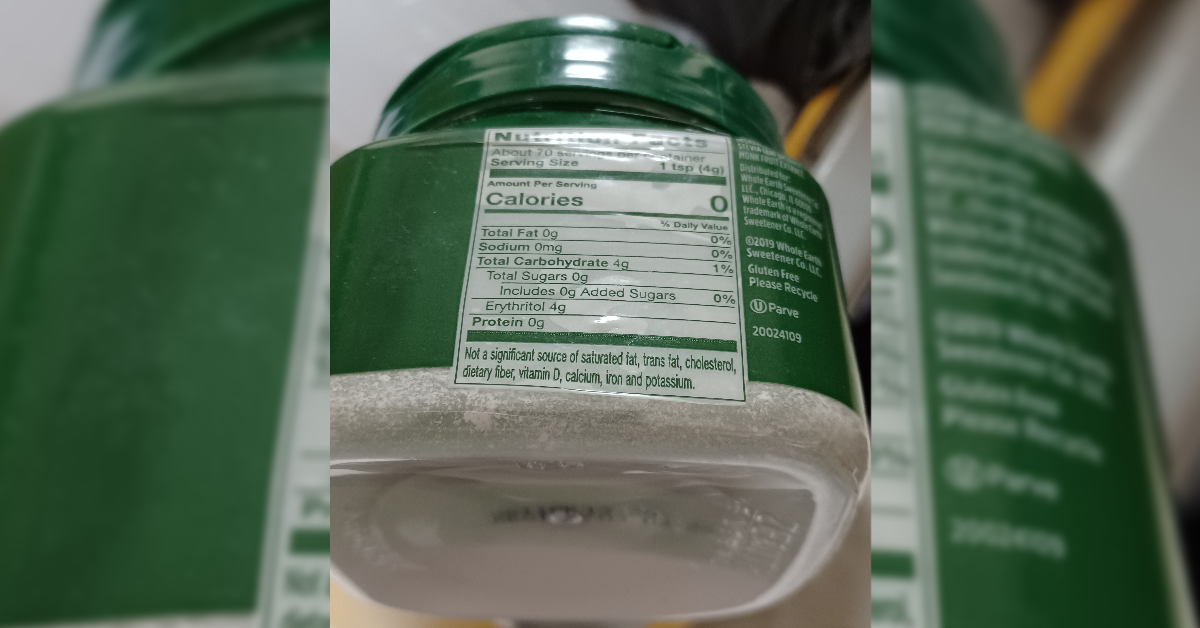A National Institutes of Health (NIH)-funded research paper looking for compounds in the blood associated with future cardiac risk appeared in the journal Nature Medicine on Feb. 27, 2023, and points to a link between elevated levels of erythritol and several related artificial sweeteners, and a risk of blood clotting, stroke, and heart attack in those with existing comorbidity factors for heart disease such as diabetes, obesity, and metabolic syndromes.
Many products on store shelves are looking to cut calories and reduce the use of sugars. Some leading replacements are synthetic, like sucralose, aspartame, and saccharin, while others, like allulose, stevia, and monk fruit extract, are considered “natural” because they’re derived from plants.
Erythritol is a bacterially-fermented sugar alcohol with slightly different physical and chemical properties than sugar. It forms anhydrous crystals with a moderate sweetness of 60–80% of table sugar and six times fewer calories. Organic erythritol is found in small amounts in grapes, peaches, pears, watermelons, and mushrooms. It is also made when things like wine, beer, and cheese ferment. The body naturally creates low amounts of erythritol in cells, so any additional amount accumulates.
Erythritol is “Generally Recognized As Safe (GRAS)” by the FDA, which means there is no requirement for long-term safety studies. However, when used as a sweetener, it is 1,000 times the amount found in nature.
“Sweeteners like erythritol have rapidly increased in popularity in recent years, but there needs to be more in-depth research into their long-term effects,” said senior author Stanley Hazen, M.D., Ph.D., in a statement released to EurekAlert!
The real problem with this sweetener is its popularity among manufacturers. Erythritol is a very difficult product to manufacture. Erythritol is made by fermenting corn starch with moniliella pollinis, a natural microorganism, to generate glucose (sugar), then fermented with yeast or another fungus. But it makes up for that difficulty and expense because of what it does to the taste of other sweeteners.
Erythritol is mixed with more intense sugar substitutes and low-calorie sweeteners and is common in sugar-free or keto products due to the absence of an aftertaste. It exhibits a strong cooling sensation and is often the first ingredient in stevia and monk fruit crystal sugar replacements because of how it improves the “mouth feel” and masks certain unwanted aftertastes.
An article on PubMed Central shows that the sweetener may be linked to increased weight gain in college students and the onset of type-2 diabetes. The majority of erythritol cannot be metabolized by the human body and is excreted days later, unmodified, into the urine without changing blood glucose and insulin levels. It may cause bloating and digestive upset in large amounts.
“Our study shows that when participants consumed an artificially sweetened beverage with an amount of erythritol found in many processed foods, markedly elevated levels in the blood are observed for days – levels well above those observed to enhance clotting risks,” said Dr. Hazen.
Results of pre-clinical studies confirmed ingestion of erythritol by those who use it in the top 25% of users, meaning it is most likely the primary sweetener used, making platelets easier to activate and form a clot.
Until there is a better examination of the long-term effects of erythritol, it seems the best way is to reduce the amount used daily. Switching from packaged foods and learning to check ingredient labels is a good start. There are many alternatives to using erythritol, even on a keto diet. When cooking, seek out blends of monk fruit, stevia, chicory root, allulose, honey, maple syrup, agave nectar, date paste, and coconut sugar.
“Cardiovascular disease builds over time, and heart disease is the leading cause of death globally. We need to make sure the foods we eat aren’t hidden contributors,” Dr. Hazen said.















